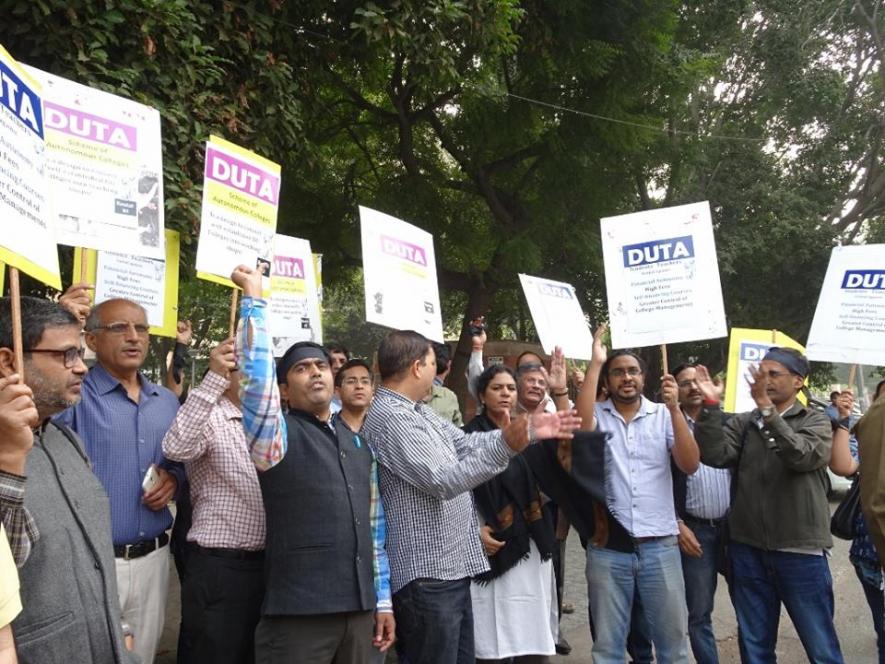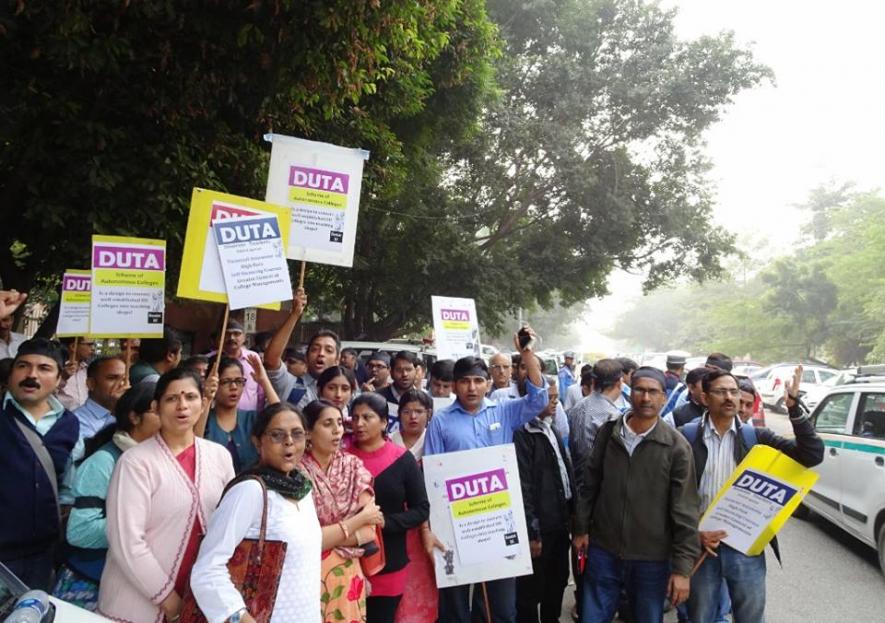Autonomous Colleges: DUTA Flash Protest Against Commercialisation of Delhi University

Image Courtesy: Abha Dev Habib
On the morning of November 16, a large number of Delhi University teachers held a flash protest, continuing their struggle against the scheme of Autonomous Colleges.
They marched to SCOPE Building at Lodi Road, where the UGC was holding an orientation programme for all college principals to discuss and push forward the proposal of granting autonomous status to colleges.
All DU principles will now be persuaded and directed by the UGC, under the order of Ministry of Human Resource Development (MHRD), to make colleges apply for autonomous status as soon as possible.
The Delhi University Teachers Association (DUTA) had called for the flash protest against this meeting.

What does ‘autonomous college’ mean for educational institutions?
In the 2016 Budget Speech, the Finance Minister announced the creation of a Higher Education Financing Agency (HEFA) to leverage funds from the market and create infrastructure. HEFA is a move to replace government grants-based funding to loan-based funding. Institutions are supposed to repay the loan by recovering it through student fees.
In the 2017 Budget Speech, the Finance Minister announced the scheme for Autonomous Colleges. The draft New Education Policy (NEP), withdrawn after widespread protests, recommends that ranking be used to “weed out” institutions that are “not performing”, and to give greater autonomy to those with high grades. The government seems to be aggressively implementing the NEP recommendations in parts, even after it stands withdrawn.
Soon after the budget speech, newspaper reports carried names of six colleges being considered for the grant of autonomy – St Stephen’s College, Hindu College, Hans Raj College, Shri Ram College of Commerce, Sri Venkateswara and PGDAV.
On 25 February 2017, the governing body of St. Stephen’s College, in an emergent meeting, decided to apply to the university for autonomy under the provisions of the UGC Guidelines. Despite stiff opposition from students and teachers, St Stephen’s management is moving fast on the agenda.
The Autonomous College scheme is being pushed by the government directly through the UGC and the university administration. The proposal to grant autonomous status to colleges identified on the basis of ranking is to incentivise commercialization in the form of self-financing.
Basically, this autonomy is an administrative autonomy whereby the governing body and other administrators of the colleges will be free to raise fees, and the brand names of colleges will be used to convert them into teaching shops to earn profit. Furthermore, the teachers will not be structuring the curriculum and syllabus or contributing to improving the standards of academics; which has always been the norm.
Once the autonomous status is granted, big universities like DU will disintegrate.
To get a degree, students will have to pay many times more than they what they pay now. Basic courses in humanities and sciences will be discouraged, while market-oriented courses would be introduced in the colleges to earn maximum profit and attract students who can pay high amounts of fees.
The service conditions of teachers and non-teaching staff will be decided by the local administrator, which is the governing body; at present, it is decided by the UGC for colleges all over India.
In addition, the moment a college becomes autonomous, the teachers of that institution will not be allowed to be members of DUTA.
The original idea of giving greater academic freedom to select colleges was floated by the Kothari Commission (1964- 66).
“That idea [Kothari commission] did not envisage decoupling such autonomy from government funding,” said Rajib Ray, DUTA president.
Autonomous colleges will mean that college managements will be free from regulatory mechanisms and checks and balances imposed by the rules of the university. There are 441 autonomous colleges in the country, and they are forced to follow a model similar to self-financing colleges.
How will this affect education in India?
The Autonomous College scheme represents an assault on both affordable and quality education.
The UGC’s 12th plan says that funds given as autonomous grant cannot be used for creation of posts, payment of salaries and honorarium to college staff, to meet normal college contingency requirements or for subsidies. It further adds that examination fees should be fixed so that the income from fees can meet the expenditure on examinations and other staff appointed in the examination cell.
‘Financial Autonomy’ means autonomy to raise fees to meet expenses.
The cost of education will steeply increase in these units. Every aspect from hostel facilities to examinations will be seen as a way of generating money.
Autonomous colleges are forced to float a large number of self-financing, marketable courses and drastically increase student intake with a limited number of teachers. The skewed student-teacher ratio adversely impacts quality of courses.
As degrees can only be granted by a university, autonomous colleges remain affiliated to universities only for that narrow purpose.
Thus, any association of an autonomous college with the university will be only a technical matter. The managements of such colleges may decide their own rules for admissions, examinations, etc. These colleges will be outside the ambit of the Delhi University rules. Fewer checks and balances could lead to malpractices in admissions (including management quota and capitation fees), appointments, examinations, allotment of hostel seats, etc. This will also mean reduction in the number of seats for undergraduate courses in universities.
“It is important to dispel the myth that marketable self-financing courses generate employable youth. Conversion of a large number of public funded colleges into self-financing units will be a big compromise on pure and basic humanities, social sciences and pure science courses, which are essential for any original thinking and path-breaking research,” said Rajib Ray.
What will happen to the Service Conditions of teachers and Karamcharis?
Autonomy will mean increased management control over day-to-day running of the college and in deciding service conditions of teachers and karamcharis, especially those hired to run self-financing courses. Much awaited recruitment and promotions in these colleges may take a back seat. Teachers, students and karamcharis will be discouraged from forming independent associations/unions to demand any rights from the management. Democratic spaces and avenues of debate and dissent, that are crucial for developing critical, independent and creative thinking, would shrink, leading to further decline in quality.
“The DUTA remains strongly opposed to Autonomous Status for the colleges of Delhi University as it could have very adverse effects on the service conditions of teachers and karamcharis besides making quality public education unaffordable for large sections of people.,” read a DUTA press release.
“It is a scheme that will have an adverse impact on the need for affordable and quality education. This will hit all sections of society, especially women, economically deprived students and students from backward and vulnerable sections/castes the most. A joint movement by students, teachers, karamcharis, parents and concerned citizens is the only way ahead.”
DUTA has said that it will intensify and broaden their movement against the scheme of Autonomous colleges.
Get the latest reports & analysis with people's perspective on Protests, movements & deep analytical videos, discussions of the current affairs in your Telegram app. Subscribe to NewsClick's Telegram channel & get Real-Time updates on stories, as they get published on our website.
























